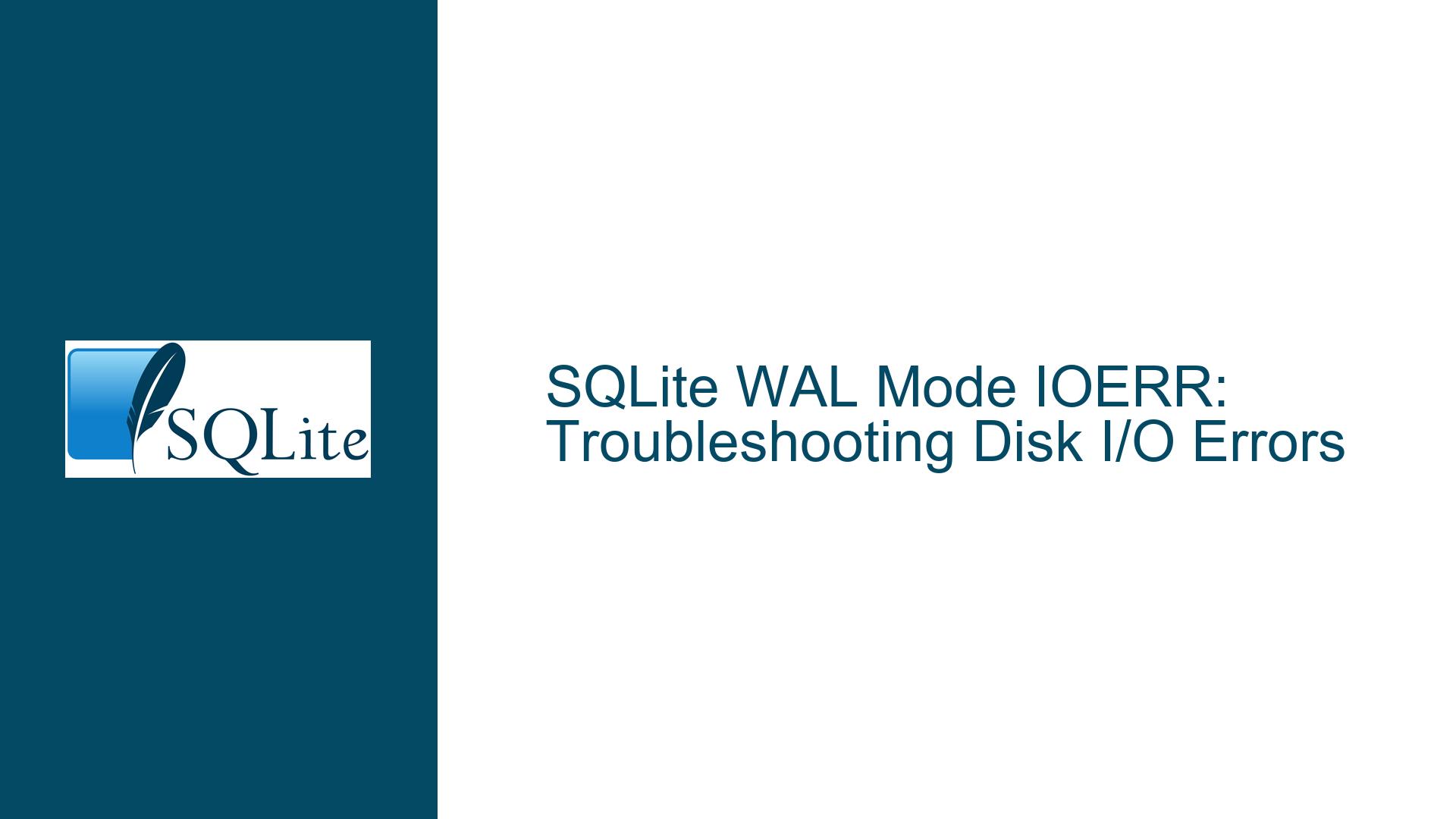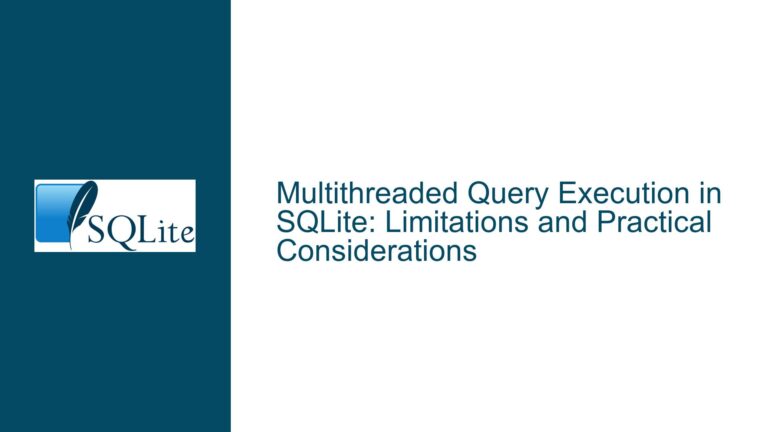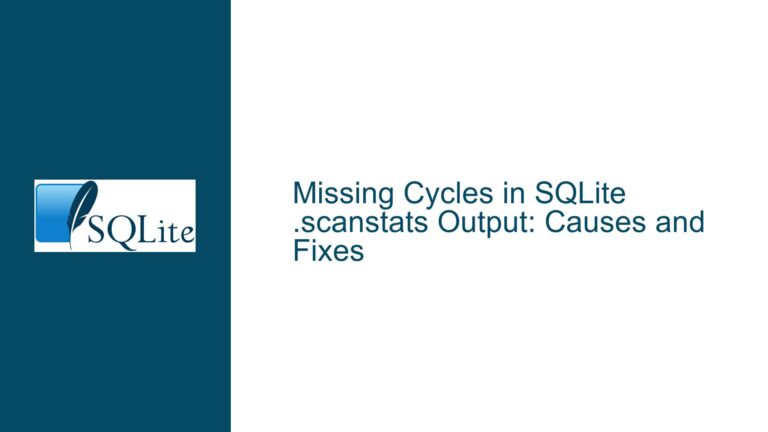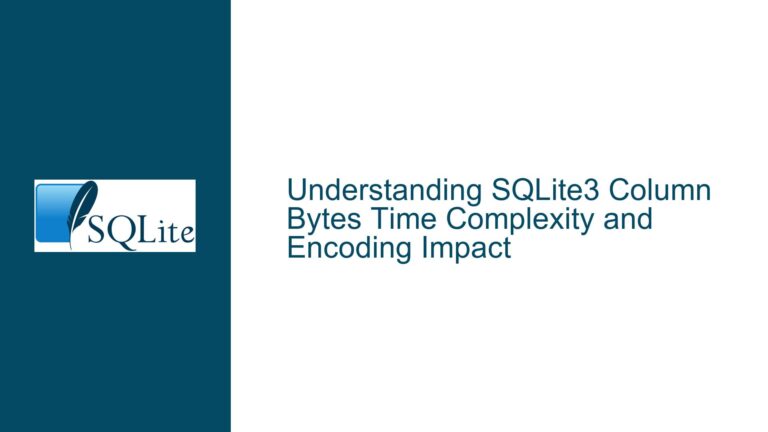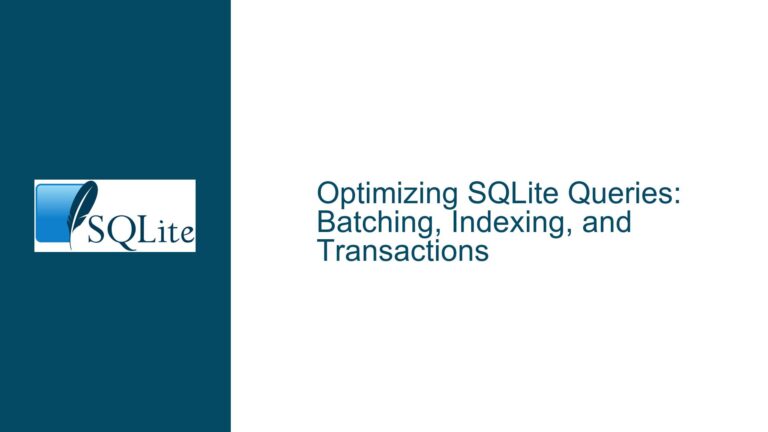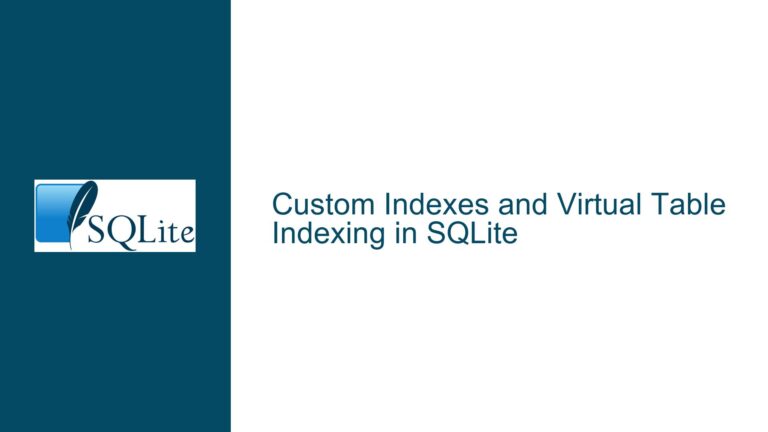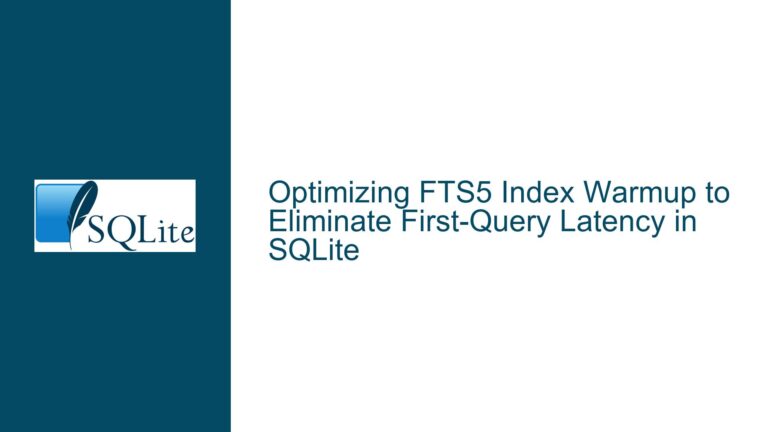SQLite WAL Mode IOERR: Troubleshooting Disk I/O Errors
Understanding SQLite Write-Ahead Logging I/O Errors During Initialization
SQLite’s Write-Ahead Logging (WAL) journaling mode represents a significant performance enhancement for many database operations, particularly in scenarios requiring concurrent access patterns. When enabling WAL mode through the PRAGMA statement journal_mode=WAL, users may encounter SQLITE_IOERR errors that manifest as disk I/O errors during the preparation phase. These errors typically surface through the sqlite3_prepare_v2 interface, presenting challenges in environments where direct filesystem access is critical.
The error signature typically presents as an ErrorIO (SQLITE_IOERR) during the PRAGMA statement execution, with the underlying system potentially returning a generic "disk I/O error" message. This behavior becomes particularly notable in Unix-like environments, specifically observed on Ubuntu 20.04.2 LTS running on EXT4 filesystems with x86_64 architecture. The error’s persistence across different SQLite versions, including the 3.28.0 amalgamation, suggests a deeper underlying cause rather than a version-specific issue.
The complexity of this error is amplified by its inconsistent reproducibility across different operating systems and filesystem configurations. While some environments, particularly macOS systems, may not exhibit the issue, Linux-based systems appear more susceptible to these I/O errors during WAL mode initialization.
Filesystem Permissions and Network Storage Considerations
The primary causes of WAL-related I/O errors often stem from several critical factors in the database environment setup. The filesystem permissions and access patterns play a crucial role in WAL mode operation. In EXT4 filesystems, the SQLite process requires specific permissions not only for the main database file but also for creating and managing the associated WAL and shared memory files.
Network filesystem implementations present a particularly problematic scenario for WAL mode operations. SQLite’s WAL mode explicitly does not support operation over network filesystems due to its reliance on shared memory and precise filesystem behavior. This limitation extends beyond simple file access to include the atomic operations required for proper WAL functionality.
The shared memory requirements of WAL mode create additional complexity in multi-process scenarios. While local filesystem access typically provides the necessary guarantees for shared memory operations, any deviation from standard local storage access patterns can trigger I/O errors during WAL initialization. This includes scenarios where the filesystem might appear local but involves additional layers of abstraction or virtualization.
Comprehensive WAL Mode Implementation and Error Resolution
Filesystem Verification Steps
The first phase of troubleshooting involves comprehensive filesystem verification. When encountering SQLITE_IOERR during WAL mode initialization, verify the complete path to the database file using filesystem tools to confirm the actual underlying filesystem type. The mount point information and filesystem type can be validated through the system’s mount table and fstab configuration.
Error Diagnostic Enhancement
To obtain more detailed error information, implement extended error code checking using sqlite3_extended_errcode instead of basic error codes. While this may not always provide additional detail for I/O errors, it establishes a foundation for systematic debugging. Additionally, enabling SQLite debug mode (-DSQLITE_DEBUG) can provide valuable insight into the internal operations during WAL mode initialization.
Filesystem Permission Configuration
Proper filesystem permissions must be established for both the database file and its containing directory. The SQLite process requires write permissions not only for the main database file but also for creating and managing the -wal and -shm files. The directory containing the database must allow file creation and modification.
// Example permission verification code
int verify_permissions(const char* db_path) {
char dir_path[PATH_MAX];
strcpy(dir_path, db_path);
dirname(dir_path);
// Check directory permissions
if (access(dir_path, W_OK) != 0) {
return -1;
}
// Check database file permissions
if (access(db_path, R_OK|W_OK) != 0) {
return -1;
}
return 0;
}
WAL Mode Initialization Protocol
Implement a robust WAL mode initialization protocol that includes proper error handling and fallback mechanisms. This approach should incorporate verification steps before attempting WAL mode activation:
int enable_wal_mode(sqlite3* db) {
char* errmsg = 0;
int rc;
// Begin transaction for atomicity
rc = sqlite3_exec(db, "BEGIN IMMEDIATE", 0, 0, &errmsg);
if (rc != SQLITE_OK) {
goto error_handler;
}
// Attempt WAL mode activation
rc = sqlite3_exec(db, "PRAGMA journal_mode=WAL", 0, 0, &errmsg);
if (rc != SQLITE_OK) {
sqlite3_exec(db, "ROLLBACK", 0, 0, 0);
goto error_handler;
}
// Commit transaction
rc = sqlite3_exec(db, "COMMIT", 0, 0, &errmsg);
if (rc != SQLITE_OK) {
goto error_handler;
}
return SQLITE_OK;
error_handler:
if (errmsg) {
sqlite3_free(errmsg);
}
return rc;
}
Performance Optimization Alternatives
When WAL mode implementation proves problematic, consider alternative optimization strategies:
PRAGMA synchronous = NORMAL;
PRAGMA cache_size = -2000;
PRAGMA temp_store = MEMORY;
PRAGMA mmap_size = 30000000000;
System-Level Configuration
Implement system-level configurations to optimize SQLite operations:
# File system mount options for optimal SQLite performance
mount -o remount,noatime,barrier=0 /path/to/mount
# System memory management
echo 'vm.dirty_background_ratio = 5' >> /etc/sysctl.conf
echo 'vm.dirty_ratio = 80' >> /etc/sysctl.conf
Transaction Management Optimization
Implement efficient transaction management patterns to minimize I/O operations:
int optimize_transactions(sqlite3* db) {
char* errmsg = 0;
int rc;
// Configure optimal transaction settings
const char* pragmas[] = {
"PRAGMA journal_size_limit = 67108864",
"PRAGMA page_size = 4096",
"PRAGMA cache_size = -2000",
NULL
};
for (const char** pragma = pragmas; *pragma; pragma++) {
rc = sqlite3_exec(db, *pragma, 0, 0, &errmsg);
if (rc != SQLITE_OK) {
sqlite3_free(errmsg);
return rc;
}
}
return SQLITE_OK;
}
Error Recovery Protocol
Implement a robust error recovery protocol for handling WAL-related failures:
int recover_from_wal_error(sqlite3* db, const char* db_path) {
int rc;
char wal_path[PATH_MAX];
char shm_path[PATH_MAX];
snprintf(wal_path, sizeof(wal_path), "%s-wal", db_path);
snprintf(shm_path, sizeof(shm_path), "%s-shm", db_path);
// Close database connection
sqlite3_close(db);
// Remove WAL and SHM files if they exist
unlink(wal_path);
unlink(shm_path);
// Reopen database with default journal mode
rc = sqlite3_open(db_path, &db);
if (rc != SQLITE_OK) {
return rc;
}
return SQLITE_OK;
}
The resolution of WAL-related I/O errors requires a systematic approach to diagnosis and implementation. By following these comprehensive steps and implementing proper error handling mechanisms, developers can either successfully enable WAL mode or implement effective alternative optimization strategies. The key lies in understanding the specific requirements and limitations of the environment while maintaining robust error handling and recovery mechanisms throughout the database operations lifecycle.
